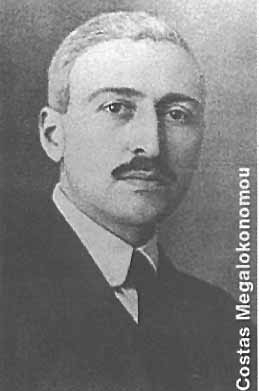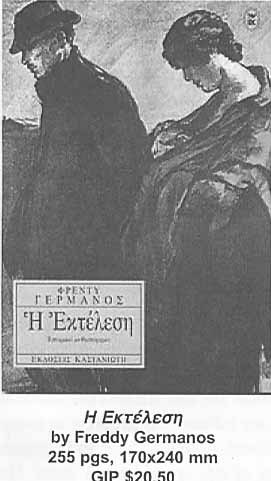 |
||
|
Ion Dragoumis, The Misguided Patriot
|
||
|
On 31 July 1920, in Athens, at a place opposite and slightly to the north of where the Hilton hotel stands today, a 42-year old Greek diplomat, writer and politician was murdered in cold blood for political reasons. His name was Ion Dragoumis. The man came from a family of Greeks who had moved in the 16th century from Albania to a village outside Florina in western Macedonia, called Vogatsiko, so as to avoid forcible conversion to Islam. Ion's great grandfather, Mark Dragoumis (1770-1854), had been a member of the "Friendly Society" that had started the Greek War of Independence in 1821. After its successful completion, Mark moved his family to Athens where some of his offspring subsequently played a significant role in Greece's public life. His son Nicholas Dragoumis (1808-1879), and Ion's grandfather, was a scholar, writer and politician belonging to the so-called "English party" (closer to England rather than France or Russia among Greece's protecting powers). |
 Ion Dragoumis |
|
| His Memoirs, published in the early 1870s, offer a penetrating account of public life under the Bavarians that King Otto had brought with him to rule the country and in particular of the efforts by Spyridon Trikoupis to introduce liberal ideas in this first ever Greek nation-state in history. His son, Ion's father, Stephanos Dragoumis (1842-1923) also became prominent in Greek politics and even held the post of prime minister for a while. However, he disagreed fundamentally with the rising star in Greek politics, Eleftherios Venizelos who, as head of the pro-Entente "Liberal Party," tried his best to bring Greeks into Greece and turn the country into a functioning modem European democracy. Venizelos managed to align Greece with the Allies during the First World War, and in doing so almost led the country to a civil war pitting his followers against the Germanophile royal family who controlled the conservative political forces in Greece. During that conflict, Ion turned against Venizelos not because of any conservative policies or pro-monarchist feelings but for reasons of his own. The 'Macedonian struggle' Ion Dragoumis was marked by the so-called 'Macedonian struggle,' i.e. the armed conflict that lasted from 1904 to 1908 between Greek and Bulgarian irregulars fighting for supremacy in Ottoman Macedonia. The Makedonomachoi (Macedonian fighters) were mostly local Greeks, but they relied heavily on the help from Athens that even provided them with regular army officers to guide their struggle. The most famous of those was Pavlos Melas, son-in-law of Ion, who was appointed commander-in-chief of the Greek bands in the areas of Kastoria and Monastir in August 1904. Melas was killed in a scuffle with the Ottomans in September of that year near Siatista. This event caused quite a stir within the ranks of the Athenian bourgeoisie, of which Melas was a prominent member. It also deeply affected Ion, who was then serving as a consular officer in Thessaloniki helping the "Macedonian fighters" all he could, even at the risk of his career. |
||
|
"You have to know," he wrote in the introduction to his book Blood of Martyrs and Heroes, addressing himself directly to his compatriots, "that if we hurry to save Macedonia, Macedonia will save us. She will save us from the dirt in which we roll, from our mediocrity and our dead spirit, from our shameful sleep..." The Bulgarian threat was at that time taken so seriously that Athens had revised its foreign policy priorities, opting for a strategy of cooperation with the Sultan who was only too happy to let the Greeks fight the Bulgarians for him in Macedonia. However, what was merely a tactical move for Athens became an obsession, almost an 'ideology' with Ion Dragoumis. |
 |
|
|
Collision course with Venizelos
Together with his friend Athanasios Souliotis he argued passionately that Greeks could carve themselves a brilliant future -thanks to their cultural superiority and business acumen-within a revamped Ottoman Empire. He was this rare breed, an anti-irredentist Greek. For him, Greece was a nation that did not need a territorial state to house it with all the concomitant troubles to defend it, govern it, develop it and save it both from outside predators and from itself. He was happy to leave all this to the Ottomans while the Greeks would become the elite within the Empire. "Concerning the government," he wrote, "I feel disgusted, 1 despise it. When 1 think of it 1 feel depressed, 1 retreat and fade away. On the other hand 1 get up, rise and blossom when 1 come in contact with Hellenes." Such an attitude was bound to steer him into a collision course with Venizelos who had dedicated his life (and nearly lost it one day before Ion was murdered) to modernising, strengthening and expanding Greece with the help of west Europe at the expense of the Ottoman Empire. The Treaty of Sevres (1920) marked Venizelos' finest hour. Vindicating his firm policies of strong loyalty to the Entente Powers during the First World War, the Treaty granted Greece both Western and Eastern Thrace, the islands of Imvros and Tenedos, and confirmed her sovereignty over the other Aegean islands that Greece had held since 1913. It also entrusted the administration of the Smyrna area to the Greek state, making it responsible for public order in the region. In accordance with the principles of self-determination, the inhabitants in the area would be free to decide in five years' time whether they preferred union with Greece or to remain part of Turkey. The Treaty of Sevres was a triumph for Greek irredentism, and personally for Venizelos, who had achieved it against the bitter opposition of the Greek monarchy and the Greek Right. Two days after the Treaty was signed, on 30 July 1920, Venizelos became the target of two cashiered royalist Greek army officers who shot repeatedly at his car as it was driving him to the Lyon railway station in Paris for his return to Greece. Venizelos was only slightly wounded in his right hand. In Athens, the Venizelists exploded with rage. The violent end of a visionary In the morning of 31 July 1920, Ion Dragoumis was at the theatre of Marika Kotopouli, the famous actress with whom his tempestuous love affair had become legendary in the whole of Greece. Suddenly the "distorted" news struck them like lightning. "Venizelos has been murdered in Paris," was the message that reached them. Ion and Marika left the theatre in Ion's small Ford car for his house at Xenia Street, opposite today's Concert Hall (Megaro Mousikis), where friends had started to gather. Bad news soon reached them from downtown Athens. Even though Venizelos was safe, gangs of his supporters had stormed the Kotopouli theatre and offices of the anti-Venizelist newspapers. Ion and Marika then took the car and drove to Kifissia, a northern suburb of Athens, to Marika's residence. At Ampelokipi, they were stopped and had their identities checked by the "Security Battalion" under the command of a certain Gyparis-a Cretan strongman-responsible for the personal security ofVenizelos. When they reached Kifissia, Marika begged Ion to stay with her but he had other plans. He took the car and drove back to Athens. At Ampelokipi, he was stopped once again by the soldiers of Gyparis' unit. At 3 pm, about 10 of them, fully armed, took him southwards on foot. At the junction of Papadiamantopoulou Street and Kifissia Avenue, exactly at the spot where a memorial column was erected for Ion Dragoumis that still stands today, he was told to stop. The soldiers aligned themselves opposite him at six feet, turned their rifles on him and fired. He was killed on the spot. The assassination left Athenians aghast. The revulsion of the Venizelists, however, was mitigated by the rage they had experienced when Venizelos was chosen as a target just at the moment of his triumph, when the dream of 'Greater Greece' was coming true. "Why on earth did Ion have to leave his house that day?" wondered one of them by the name of Nicholas Dragoumis, cousin of Ion and father of this scribbler. A number of historians and scholars have speculated that had Ion Dragoumis been spared he would have certainly emerged as Greece's premier after the November 1920 elections that the Liberals lost by a landslide. Perhaps, the speculation goes, the "Asia Minor Catastrophe" might have thus been averted because even if Ion's utopian vision of a Greek-Turkish symbiosis within an "Eastern Empire" had been definitely over, he might nonetheless have built some kind of Greco- Turkish Entente that could have avoided the ensuing bloodshed. However, what might have been is the stuff of fiction, not history. As it happens Ion Dragoumis remains a romantic figure in Modern Greek history, a man who promoted to the bitter end an idea which, however ill-conceived, he pursued tenaciously to the bitterest of ends during his short life. |
||
HCS readers can view other excellent articles by the Athens News writers and staff in many sections of our extensive, permanent archives, especially our News & Issues, Travel in Greece, Business, and Food, Recipes & Garden sections at the URL http://www.helleniccomserve.com./contents.html
All articles of Athens News appearing on HCS have been reprinted with permission. |
||
|
||
|
|
||
|
2000 © Hellenic Communication Service, L.L.C. All Rights Reserved. http://www.HellenicComServe.com |
||

